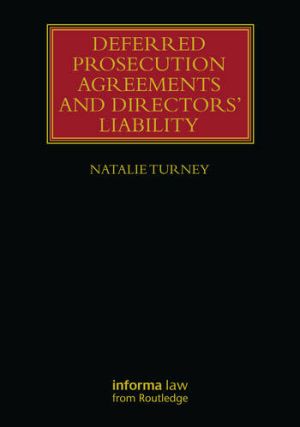
This book provides in-depth analysis of deferred prosecution agreements (DPAs), a tool first introduced in the United States and since implemented in the United Kingdom and other jurisdictions. The central focus of the book is the impact of DPAs on company directors: DPAs were first introduced in the US for individuals, but are now used predominantly for corporate defendants. In the UK, DPAs have only ever been available for companies.
The consideration of individuals in the introductory stage in the UK is explored in depth, as well as the consideration and targeting of individuals in cases that have followed. Company directors are exposed to liability because of this negotiated deal between the company and prosecutors, and this book addresses the key areas of exposure, and how various parties should address these risk areas in accordance with the law. The book is an increasingly necessary contribution to the topical discussion of the fallout of unsuccessful prosecutions of individuals implicated in the wrongdoing constituting the basis of DPAs, calling into question not only treatment of those individuals but also the integrity of the DPA tool itself. It also considers the impact of DPAs and arising exposures on directors’ and officers’ (D&O) liability insurance, therefore covering potential risk areas and the ability of directors to access a defence in protecting themselves from liability. The book covers the impact on all areas of a D&O policy, considering D&O policy wording and insurance law in doing so, providing a rounded account of issues arising in relation to company directors and how interested parties can act in the best interests of all whilst in accordance with law and policy.
The primary audience for this book will be lawyers and practitioners in the corporate crime and/or insurance law space, including general counsels, solicitors, barristers, consultants, prosecuting authorities, legal academics, and so forth. It will also be of interest to company directors, and to students of financial crime, corporate criminal crime and insurance law, and will have great international appeal. Organisations likely to use the book will include prosecuting authorities, law firms working on corporate criminal liability or D&O insurance cases, and companies looking to protect themselves where there is alleged wrongdoing.